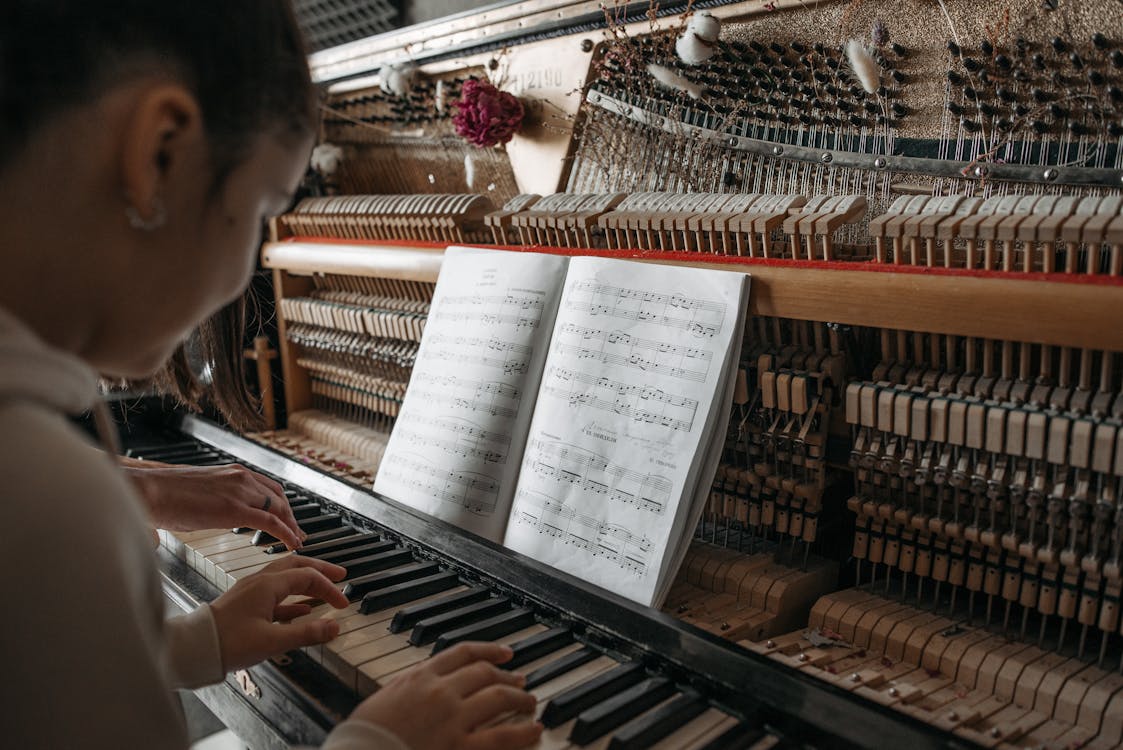Want to learn to play any instrument faster?
It’s not practicing more…it’s practicing smarter.
Every day millions of people sit down at their instruments and wonder why they’re not improving faster. They practice for hours and still struggle with the same passages. They make the same mistakes over and over.
The thing is…most people have no idea how to practice effectively. They just play through pieces over and over, hoping it will magically make them better. But it doesn’t work that way.
Recent research has found that students who use self-regulation strategies during practice make significantly greater improvement than those using basic practice techniques alone.
Stuff You’ll Learn:
- Why Most Practice Sessions Fail
- The Science Behind Effective Practice
- Smart Practice Techniques That Actually Work
- How to Build a Bulletproof Practice Routine
- Mental Practice Strategies
Why Most Practice Sessions Fail
Here is a little secret…
75% of people who play instruments started before age 11. But most of them never learn how to practice effectively. They just wing it and hope for the best.
So what’s the typical practice session look like?
- Sit down with instrument
- Play through pieces a few times
- Stop at mistakes
- Repeat same errors over and over
- Get frustrated and quit
Sound familiar? This approach doesn’t work because it’s not focused, doesn’t have clear goals, and doesn’t use smart practice techniques.
The truth is that effective practice isn’t about how long you practice…It’s about how intelligently you practice. You can practice 3 hours and make zero progress, or you can practice 30 minutes and make significant improvements.
The Science Behind Effective Practice
Do you want to know what separates the pros from the amateurs?
Researchers at Indiana University discovered something incredible. They taught some students basic practice techniques (like slow practice and repetition). But they also taught other students self-regulation strategies (goal-setting, planning, self-evaluation).
The students who only learned basic practice techniques improved, of course. But the students who also learned self-regulation strategies improved significantly more in the same amount of time.
This isn’t theory…It’s actual proven science.
The students who practiced intelligently could learn new pieces faster, play more accurately, and remember what they practiced better. All because they knew how to practice, not just what to practice.
Smart Practice Techniques That Actually Work

Ready to revolutionize your practice sessions? These game-changing techniques will transform everything…
Break It Down Into Bite-Sized Pieces
Stop trying to play entire pieces perfectly.
Instead, focus on mastering small sections – maybe 2-4 measures at a time. Perfect these tiny sections before moving on. This helps your brain process information without being overwhelmed.
You can play a section perfectly 3 times in a row, then you’re ready to move on to the next section. If not, work on it more. Perfect, then move on.
The Slow Practice Method
Here’s something most people get wrong…
They practice at full speed, play through mistakes, then wonder why they’re not getting faster. Always start slow. Slowly, painfully slow.
Why? Because your brain needs time to build the correct muscle memory. When you practice slowly, you’re programming your brain the right way. When you practice fast and make mistakes, you’re programming those mistakes.
Start at 50% of the desired speed. Then only when you can play it perfectly there, bump it up to 60%. Keep going until you reach full speed.
Mental Practice Is Magic
Here’s a practice technique most people ignore completely…
Practice without your instrument.
Sounds crazy, but believe me, mental practice is incredibly powerful. Study your sheet music, visualize yourself playing perfectly, hear every note in your head.
Science shows that mental practice can be nearly as effective as physical practice for some skills. And you can do it anywhere – on the bus, before bed, during lunch break.
Smart Repetition Strategy
Not all repetition is created equal.
Most people repeat passages mindlessly. Smart musicians use targeted repetition. Here’s how to do it:
- Identify the exact problem (wrong note, bad timing, poor technique)
- Isolate that specific problem
- Practice that problem slowly
- Gradually increase speed
- Test in context
Make a mistake? Stop immediately. Don’t keep playing through it. Each time you play through a mistake, you’re reinforcing it.
How to Build a Bulletproof Practice Routine
The secret to consistent progress?
A practice routine you actually stick to.
Most people make goals like “I’ll practice 2 hours daily” and then quit after a week. Start small and build up.
The 20-Minute Rule
Science says focused practice in short bursts is way more effective than long, unfocused sessions. Start with just 20 minutes of focused practice.
Here’s a proven 20-minute practice structure:
- 5 minutes: Warm-up (scales, simple exercises)
- 10 minutes: Work on current piece (using techniques above)
- 5 minutes: Review previous material / sight-reading
That’s it. Simple, effective, and sustainable.
Set Specific Goals
Vague goals = Vague results.
Instead of “practice piano,” set specific goals like “Play mm. 16-20 of Bach Invention flawlessly at 80 BPM” or “Master the left hand pattern in bars 5-8.”
Specific goals give you something concrete to work toward and help measure progress.
Track Your Progress
Keep a practice journal. Write down what you worked on, what improved, what still needs work, goals for tomorrow. This simple habit will supercharge your progress.
Advanced Mental Strategies

Let’s take your practice to the next level with these advanced mental strategies…
Visualization Technique
Before you touch your instrument, spend 2-3 minutes visualizing perfect performance. See yourself playing flawlessly, hear every note clearly, feel the correct fingerings.
Elite athletes use this all the time. Musicians should too.
Recording Method
Record everything.
Your phone’s voice recorder is the most powerful practice tool you own. Record yourself playing, then listen back with fresh ears. You’ll hear mistakes you completely missed while playing.
Focus on One Thing at a Time
Don’t try to fix everything at once.
Pick one specific element to focus on during each practice session – timing, intonation, dynamics, or technique. When you focus on one thing, you make progress. When you try to fix everything, you fix nothing.
Let’s Wrap This Whole Thing Up
Bottom line…
Effective practice isn’t about grinding hours. It’s about practicing smarter, not harder. 52% of US households have someone who plays an instrument but most never reach their potential because they don’t know how to practice well.
Use these techniques consistently for just one month, and you’ll see dramatic improvements in your playing.
Remember:
- Start slow, then build speed gradually
- Focus on small sections at a time
- Use mental practice to supplement physical practice
- Set specific, measurable goals
The difference between amateur and professional is NOT talent…It’s how effectively they practice.


